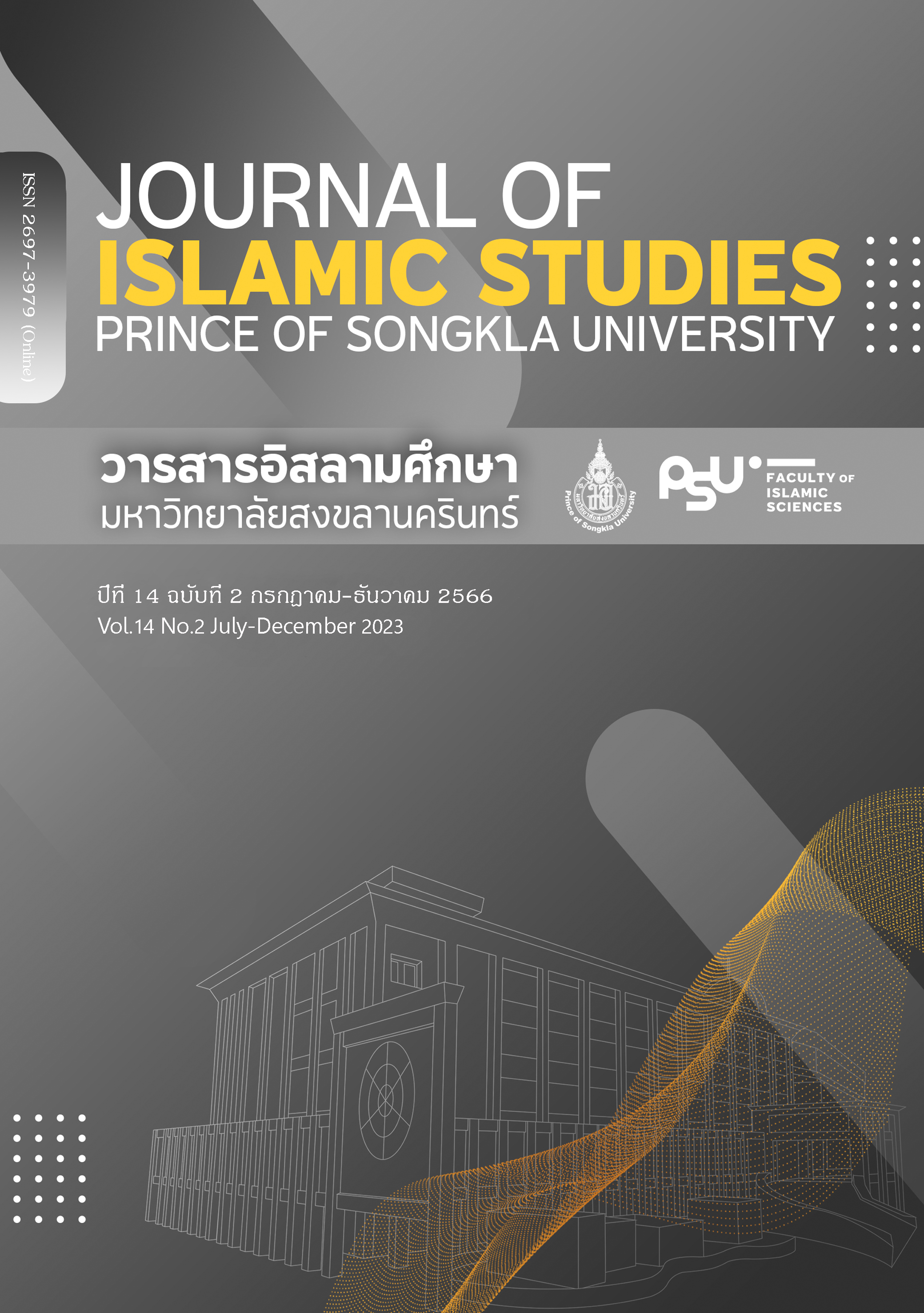The Development of Reading Comprehension Skill by SQ3R Technique on al-Hadith Subject for Intermediate Islamic Studies Stage Students, Year 2
Keywords:
Reading Comprehension Skill, SQ3R technique, al-hadith subjectAbstract
Objectives 1) to develop and find the consistency of the learning management plans using the SQ3R technique on al-Hadith subject for intermediate Islamic studies stage students, year 2, 2) to develop reading comprehension skill by using the SQ3R technique using the criteria of 70 percent, 3) to compare the learning achievements between before and after learning management and 4) to study the students’ satisfaction towards learning management by using the SQ3R technique.
Methodology The target group used in this research were 25 students of Bannangsta Wittayanusorn which were studying in the second semester of 2022. The research tools consisted of 1) learning management plans using SQ3R technique on al-Hadith subject for intermediate Islamic studies stage students, year 2, 2) reading comprehension skill assessment using SQ3R technique of al-Hadith subject, 3) achievement test before and after studying by using the SQ3R technique 4) satisfaction questionnaire of the learning management by SQ3R technique on al-Hadith subject. Statistics used in data analysis were percentage, mean, standard deviation and t-test.
Research findings 1. The efficiency of the implementation of learning management plans using the SQ3R technique for intermediate Islamic studies stage students, year 2 was an average of 80.60/85.47 2. The reading comprehension skill using the learning plans using SQ3R technique on al-Hadith subject was higher than the average criteria of 72.79%. 3. The learning achievement using SQ3R technique after learning was higher than before learning at statistical significance at the 0.05 level. 4.The students’ satisfaction towards on learning management using SQ3R technique on al-Hadith subject in overall was at the highest level (µ=4.59, σ=0.27).
Contribution this reseacrh can be use to design learning management plan for The Development of Reading Comprehension Skill
References
Kusumayanthi, S., & Maulidi, S.M. (2019). The Implementation of SQ3R Technique in Teaching Reading Comprehension. The Journal of English Language Teaching, Literature, and Applied Linguistics (JELA), 1(2). 74-80.
Lamboonyarit, P. (2021). The Development of The Active Learning Instructionalpackage by Using SQ3R Technique for Enhance the Readingcomprehension Skills for Grade 3 Students of “Piboonbumpen” Demonstration School, Burapha University. Journal of Education Burapha University, 32(1). 77.
Milung, N. (2018). Result of Using Learning Activity Packages to Develop Analytical Reading Competency in Thai Subject Area Group for Mathayomsuksa III Students Apply the SQ3R Method. Journal of Education Naresuan University, 20(4), 108.
Moonkam, S. (2008). króp krêuuang rêuuang gaan kít [The Perfection of Thinking]. Phap Phim Company Limited.
Narongraksakhet, I. (2009). bprà-wàt gaan sèuk-săa ìt-sà-laam [The History of Islam Education]. Teaching Islamic Studies Department. Islamic Education College.
National Institute of Educational Testing Service (Public Organization). (2021). rá-bòp bprà-gàat láe raai ngaan pon gaan tót sòp mâat-dtrà-tăan ìt-sà-laam sèuk-săa I NET [Announcement System and Islamic National Educational Test]. https://www.niets.or.th/
Pormanumat, J. (2021). The Development of Reading Comprehension Exercises Using SQ3R Technique with a Mind Map In Thai Learning Area for Grade 4th Students. E-Journal of Education Studies, Burapha University, 3(4), 31.
Saiyot, L., & Saiyot, A. (2000). ték-ník gaan wí-jai taang gaan sèuk-săa [Educational Research Technique]. Suweeriyasan.
Thipsaiyas, N. (2018). The Development of English Reading Comprehension Activity Package Using SQ3R Reading Technique for Pratomsuksa 3 Students. College of Education Science, Dhurakij pundit University.
Downloads
Published
How to Cite
Issue
Section
License
Copyright (c) 2023 © The Author(s). Published by the Journal of Islamic Studies, Prince of Songkla University under the Creative Commons Attribution 4.0 International License.

This work is licensed under a Creative Commons Attribution 4.0 International License.
All articles Published in The Journal of Islamic Studies are author’s opinions, and not the responsibility of the Faculty of Islamic Sciences nor the editorial board. However any citation should be referred to the journal.
















